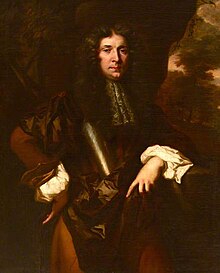Sir John Banks, 1st Baronet

Sir John Banks, 1st Baronet FRS (1627 – 18 October 1699) was an English merchant and MP, who rose from relatively humble beginnings to be one of the wealthiest merchants in London and owner of several properties.
Life[]
Banks was born the son of Caleb Bankes (died 1669) of Maidstone, Kent, gent, and Martha Dann. He was educated at Emmanuel College, Cambridge.[1]
About 1657, Banks married Elizabeth Dethick, daughter of Sir John Dethick. They had several children, including Caleb, Mary and Elizabeth.[2] His son Caleb was MP for various constituencies, but predeceased him without issue in 1696.
Banks was created a baronet by King Charles II in 1661. He was elected a Fellow of the Royal Society in 1668.
He invested in the overseas trade with the East and with Africa and in 1677 was financially involved in an expedition to search for a North-east trade route. He was Governor of the East India Company in 1673–74.[3]
Banks was Member of Parliament (MP) several times; for Maidstone 1654–1659, for Winchelsea 1678, for Rochester 1679–1690, for Queenborough 1690–1695 and again for Maidstone 1695–1698 [4]
In 1672, he advocated for the rights of non-conformist congregations to be allowed to meet.[5]
On Banks death in 1699 the baronetcy became extinct. He was survived by two married daughters (Mary, who had married John Savile and Elizabeth, who had married Heneage Finch) who were co-heiresses to his estate.
Notes[]
- ^ "Banks, John (BNKS644J)". A Cambridge Alumni Database. University of Cambridge.
- ^ Lundy, Darryl. "Person Page 2730". thePeerage.com. Retrieved 10 May 2010.[unreliable source]
- ^ "Sir John Banks (Pepys' Diary)". Pepysdiary.com. Retrieved 10 May 2010.
- ^ Lundy, Darryl. "Person Page 2730". thePeerage.com. Retrieved 10 May 2010.[unreliable source]
- ^ "Charles II: May 18-26, 1672 Pages 1-71 Calendar of State Papers Domestic: Charles II, 1672. Originally published by Her Majesty's Stationery Office, London, 1899". British History Online. Retrieved 20 July 2020.
References[]
- Leigh Rayment's Peerage Pages [self-published source][better source needed]
- Leigh Rayment's Historical List of MPs
- 1627 births
- 1699 deaths
- Alumni of Emmanuel College, Cambridge
- 17th-century English businesspeople
- Directors of the British East India Company
- Fellows of the Royal Society
- Baronets in the Baronetage of England
- English MPs 1654–1655
- English MPs 1656–1658
- English MPs 1659
- English MPs 1661–1679
- English MPs 1679
- English MPs 1681
- English MPs 1685–1687
- English MPs 1689–1690
- English MPs 1695–1698